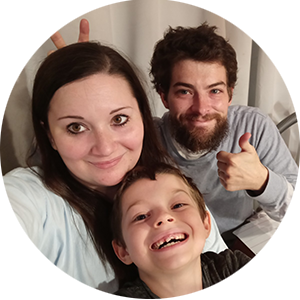
Ashley
I grew up in a relatively average family. Through most of my school-aged years I considered myself pretty “normal.” But in my senior year of high school, I began to experience anxiety and depression. I isolated myself and just wanted to be left alone. It was difficult, but I thought that going off to college would resolve the issues and get me back on track
Once I got to college my anxiety worsened. I had a panic attack my first week of classes. My family connected me with a psychiatrist who proceeded to prescribe me Xanax. I learned fairly quickly that if I had a feeling that I didn’t like, I could just numb it away. I also suffered an injury and quickly became dependent on the narcotics I was prescribed.
While I tried to quit many times on my own, I just couldn’t make it for more than a few days. My family couldn’t understand why I didn’t just stop taking the drugs. I even tried treatment at the urging of my parents, but my dad was diagnosed with brain cancer and the fear, stress and uncertainty were overwhelming and I turned to drugs again to manage the pain. My dad passed away and that seemed to be the final push toward full-blown addiction. I turned to painkillers. Then when I couldn’t access them anymore, I used whatever substances I could to survive another day and avoid withdrawal – which only made my addiction more severe and debilitating.
Opioid addiction consumed my life, separated me from my family and caused all of us years of pain and suffering. I had no hope for my future.
For years I spiraled out of control. I overdosed three times in one month (only God knows why I’m still here), ruined my relationships with friends, family and anyone else who cared about me, stole from my family and ultimately became Hurricane Ashley, leaving devastation wherever I went.
After 10 years of living in addiction, I finally found hope five years ago when I entered the UNC Horizons substance abuse program for women. I was so tired that I slept on the floor for three days straight. There, treatment saved my life. I learned the skills I need to live drug-free and how to handle the ups and downs of life in a healthy, productive way. And now, I’m able to be a successful mother, professional, and student, and am dedicated to helping others seeking recovery from addiction.
Overcoming substance abuse is more complex than just quitting taking drugs. The Foundation of Hope’s research shines a light on the science of mental illness and addiction, and their work truly saves lives. They really care about people like me, which gives all those on the recovery journey hope for their future. Now, I’m more than just a number — I am a survivor.
Will You Join Us?
Walk for treatment. Walk for life. Walk for Hope.
Sign up to receive updates on our annual event, as well as the
Foundation of Hope. Follow our stories and see your impact.

